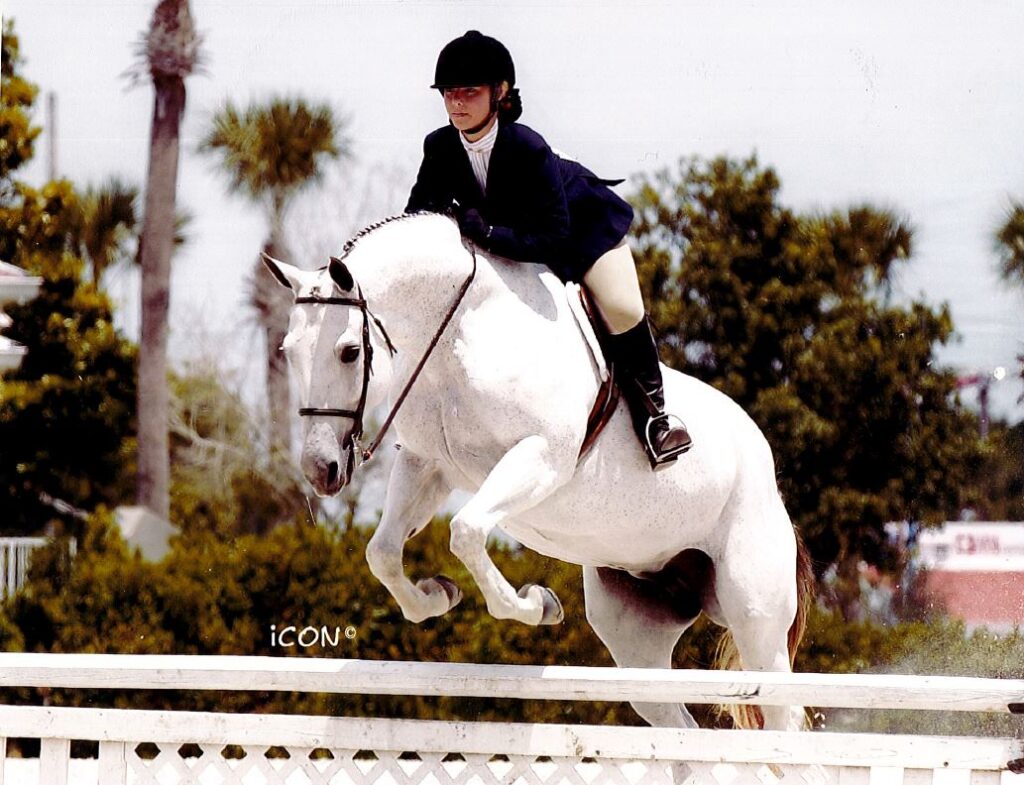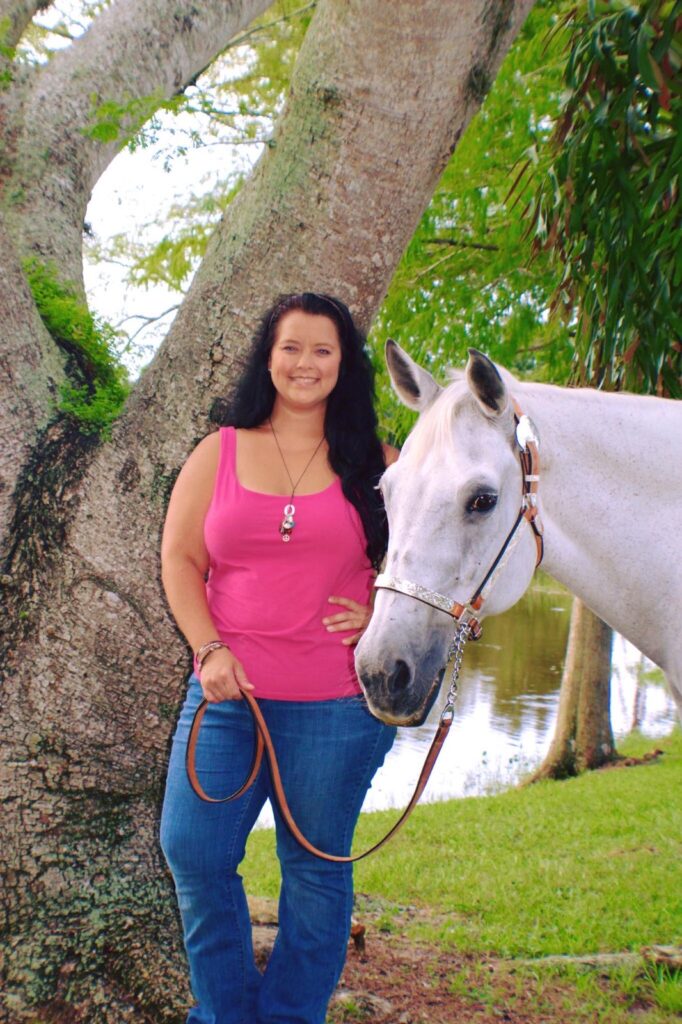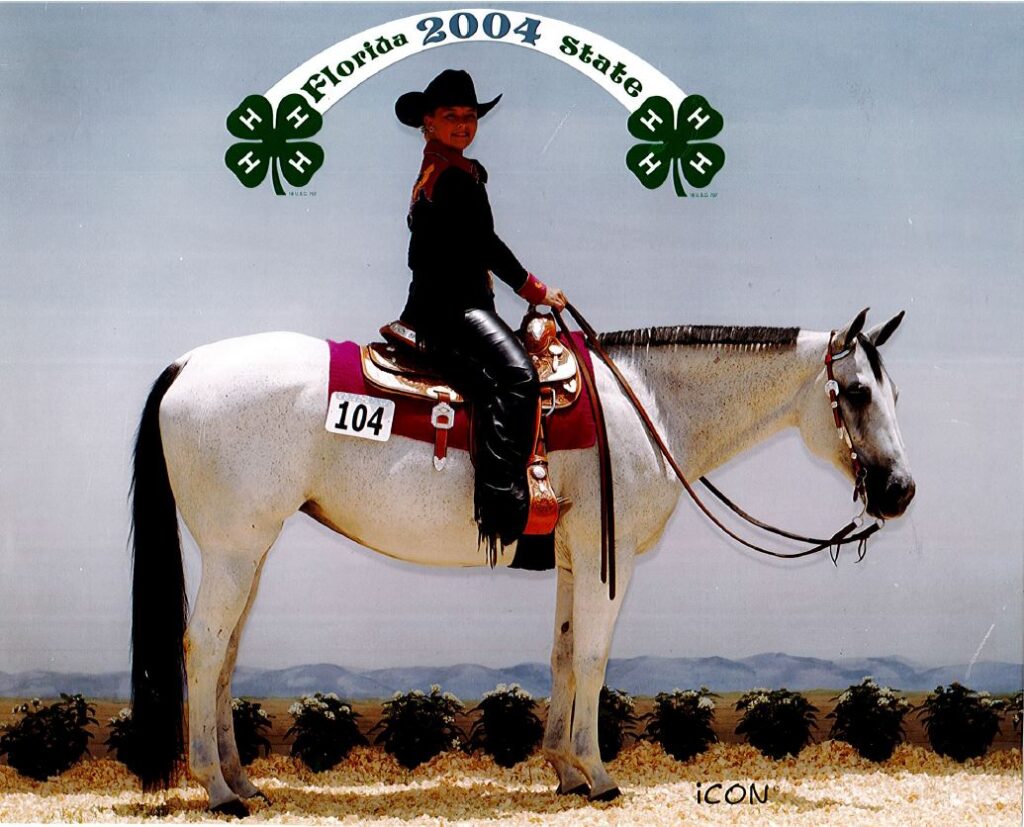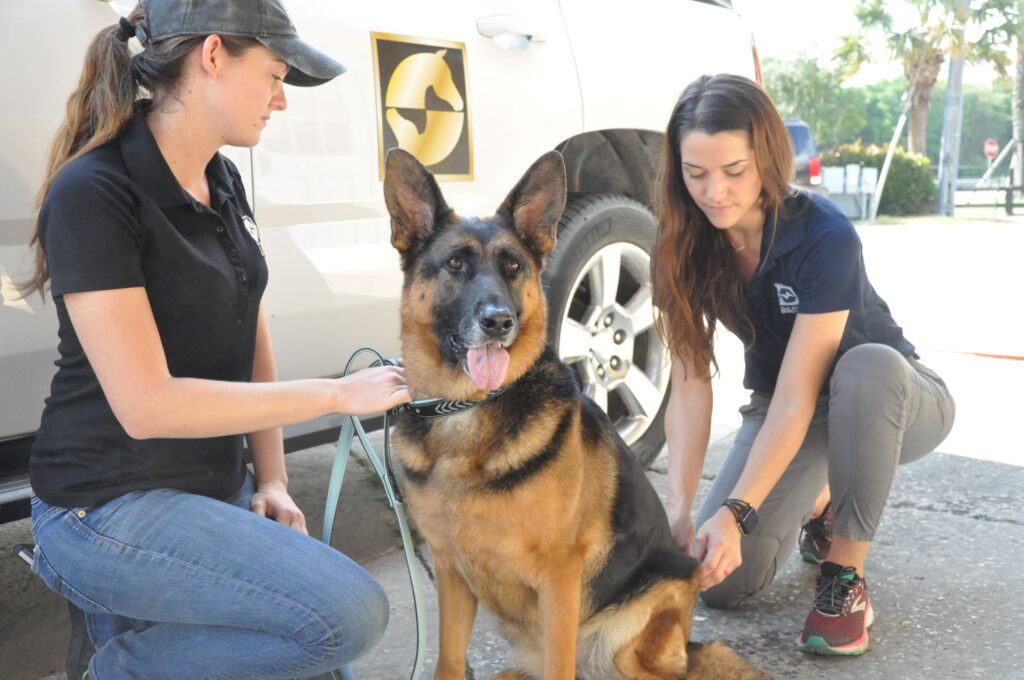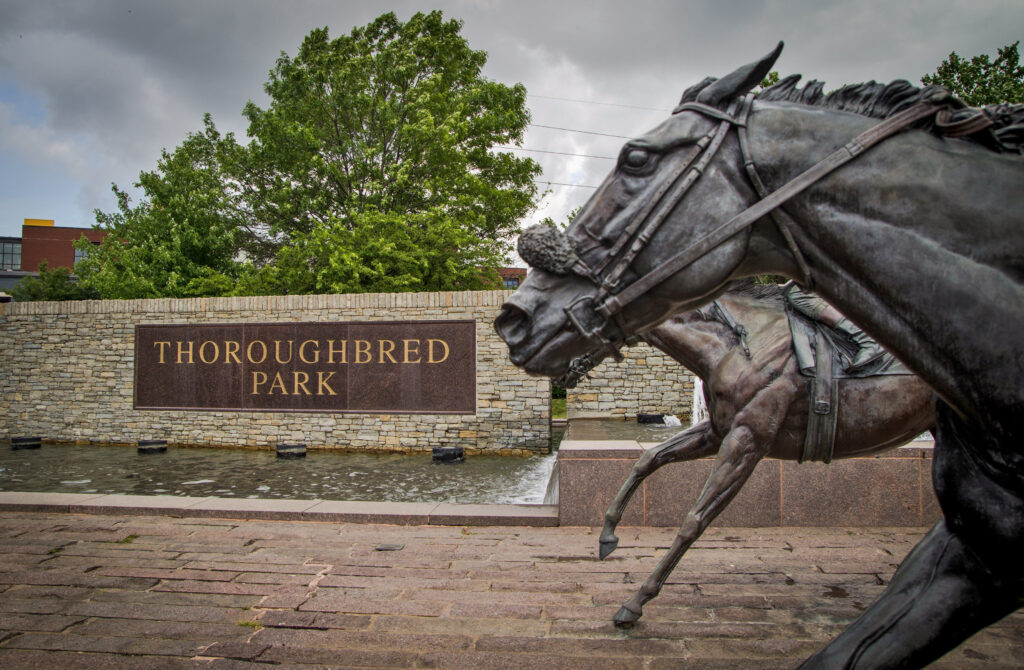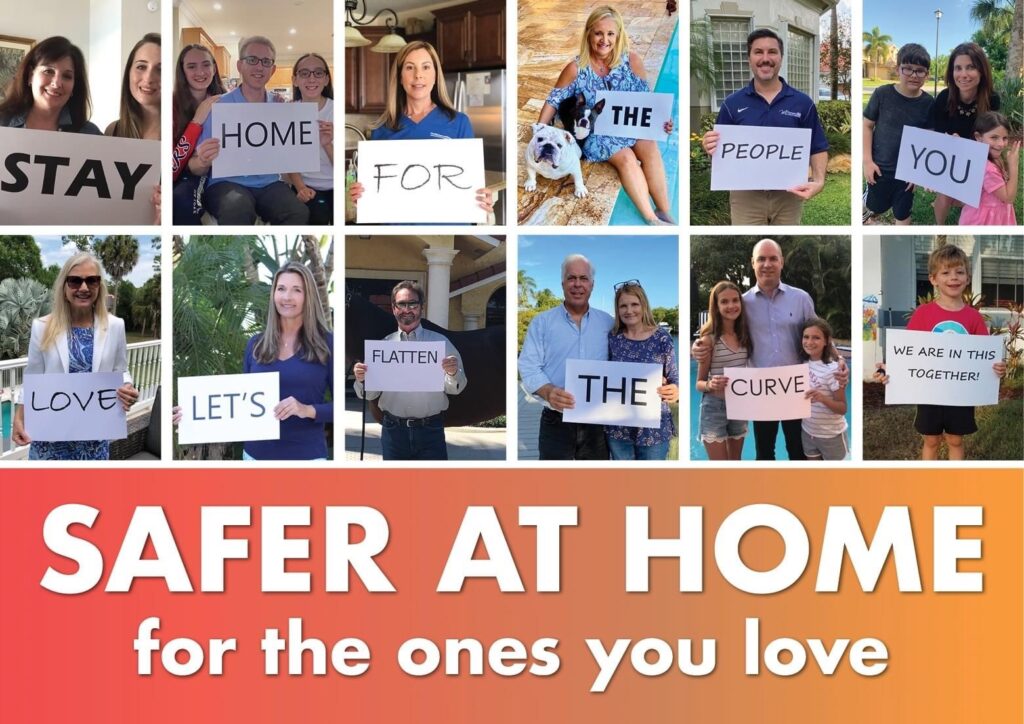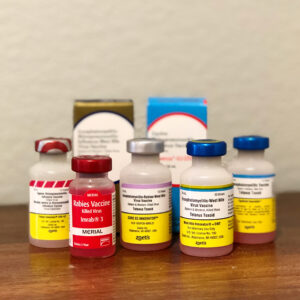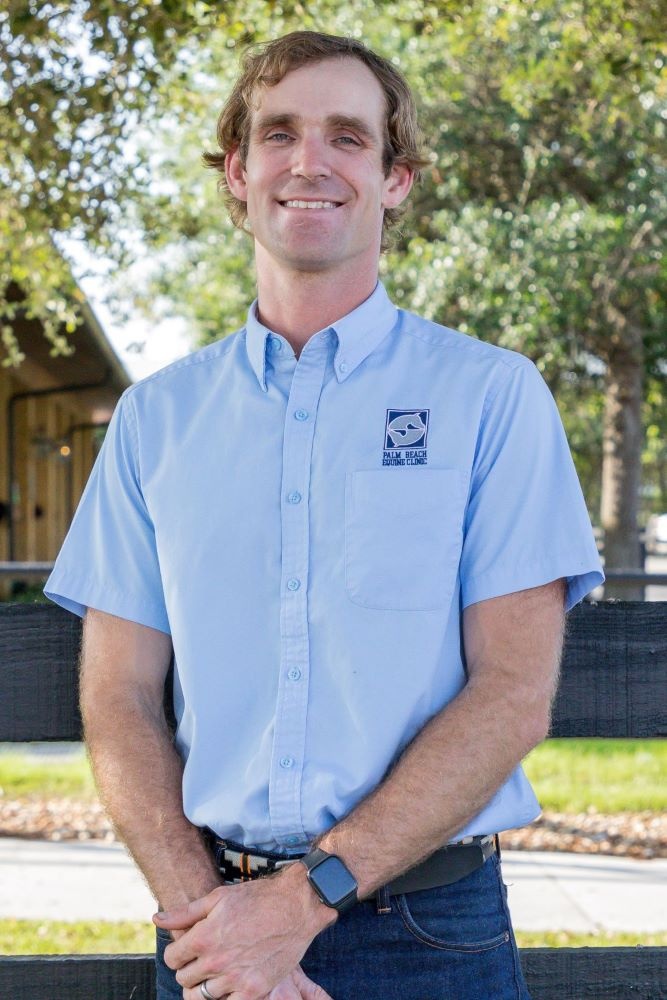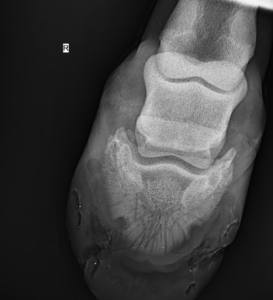Year: 2020
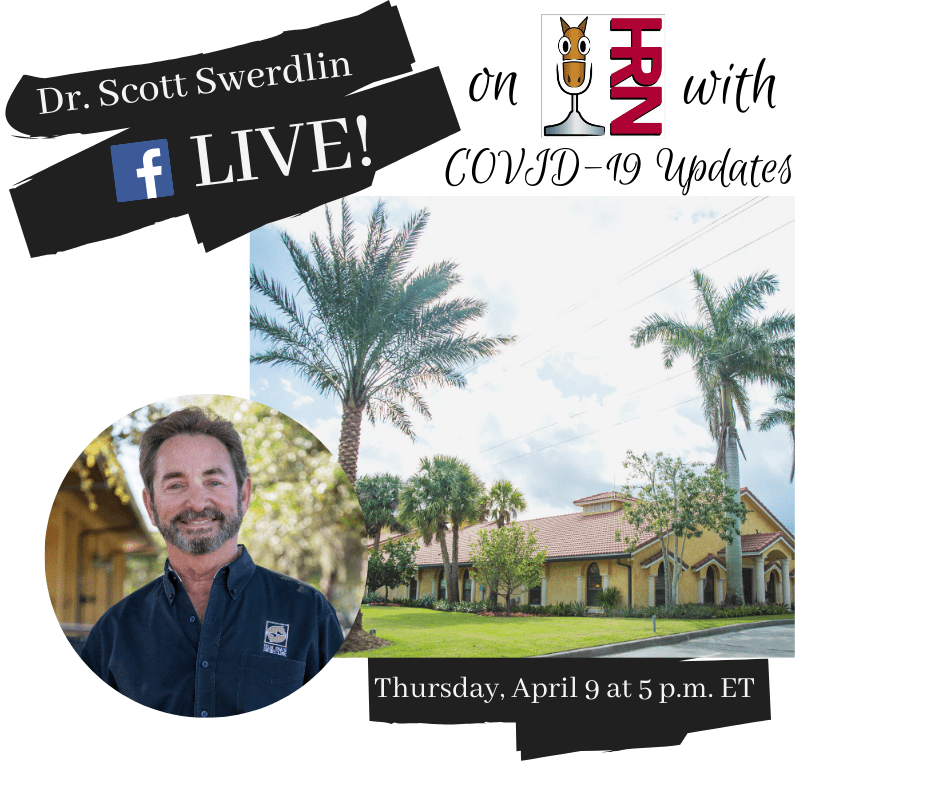
Dr. Scott Swerdlin talks COVID-19, equine veterinary medicine, and horse industry impacts with The Horse Radio Network host Glenn the Geek.
Listen to the Horse Radio Network’s interview with Palm Beach Equine Clinic President Dr. Scott Swerdlin. At about 4:30 into the video, Dr. Swerdlin talks about how veterinary clinics and equestrians are adjusting to life amid the novel coronavirus pandemic. The Horse Radio Network is the leading online radio (podcast) network for horse lovers worldwide.
Dr. Swerdlin is a Florida native whose family raised cattle and horses. After attending Tulane University, he pursued a master’s degree in equine reproduction at the University of Florida, and graduated from Auburn University School of Veterinary Medicine in 1976. Dr. Swerdlin was then appointed Chief of Clinical Services at Clark Air Force Base in the Philippines.
Following his tour in the military, he started a private practice in south Florida. He served on the state Board of Veterinary Medicine from 1981-1987, and received the Gold Star Award for outstanding contributions to veterinary medicine in the state of Florida. In 1999, he became a member of the Royal College of Veterinary Surgeons and is licensed to practice in Great Britain
More Coronavirus News & Updates
When Jennifer Penn learned that her horse Belle was in the beginning stages of a bout with colic in February, she knew she was not ready to say goodbye to her beloved horse. The 33-year-old American Quarter Horse named “Wagners Mint Joker”, but known to Penn and her family as Belle, was the horse of a lifetime.
Penn’s mother, Becky Seton, and late grandfather, Bob Lowery, both of Vero Beach, FL, purchased a then 12-year-old Belle for Penn in 1998. “We were both 12-years-old and it was a match made in heaven,” recalled Penn. “I had outgrown my show pony, so it was time to look for an all-around horse that I could show and have fun with. I am an only child, so she is like a sister to me. As I grew up, I experienced life right alongside her.”
Belle quickly lived up to her reputation as an all-around horse, actively competing with Penn at AQHA breed shows, open and 4-H circuits throughout Florida, show jumping events, and they excelled in western trail competitions. Belle even pulled a cart for a time!
When Penn was 18, she started her own lesson program with Belle at the helm. “Belle provided a solid foundation for many riders, both young and old,” she said. “She not only taught me how to become a horsewoman, but she has also impacted so many young people’s lives and taught them showmanship skills. She’s special to me and my mother Becky, but also to so many people who have gone on to become very successful horsemen and women.”
While Belle was partially retired in 2018, the same year she was the guest of honor and Penn’s wedding, the mare gave her last lesson about six months ago. She was still being ridden once a week with the occasional trail or pony ride for yet another up-and-coming rider.
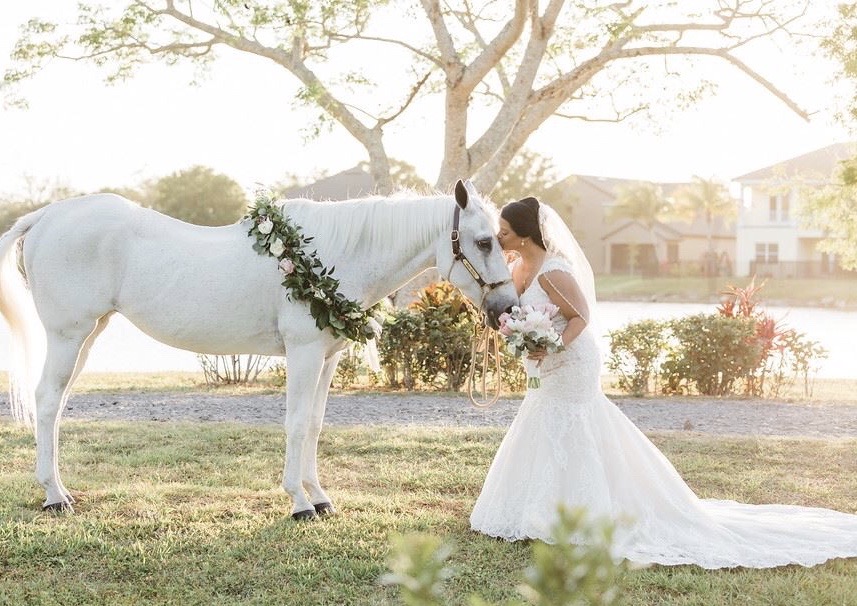
Belle was thriving in retirement until colic threatened to disrupt her life of luxury.
On Saturday morning, February 1, Belle had not been drinking from her water buckets, did not finish her breakfast, and had only passed manure twice throughout the night before; abnormal signs that Penn took very seriously. “She’s tough as nails, so she was not showing any signs of discomfort; she was just standing there quietly in her stall. By knowing her habits we were able to identify a problem and make early decisions.”
Belle was initially treated by her primary veterinarian, Dr. Kelly Alderman of Alderman Veterinary Services based in Fellsmere, FL. Based on Dr. Alderman’s recommendation, Belle was transported to Dr. Karie Vander Werf’s Treasure Coast Equine Emergency Services in Palm City, FL, where an ultrasound on Sunday showed a displacement of her large colon.
“It was very obvious to us that if we were going to consider surgery, we would have to do it sooner rather than later,” said Penn. “The decision was made to preserve her strength and transport her to Palm Beach Equine Clinic for Dr. Weston Davis to operate on her.
“It was because of his confidence in the surgery despite her age, that I had a peace in the decision to proceed with surgery,” continued Penn.
One of three board-certified surgeons at Palm Beach Equine Clinic, Dr. Weston Davis performed the emergency colic surgery to remove a right dorsal impaction in the large colon and correct a severe displacement caused by the altered motility within the intestines.
“Her primary veterinarian had done everything that she could medically do for the horse before referring the case to Palm Beach Equine Clinic,” said Dr. Davis. “In some colic cases, a prolonged course of medical treatments might result in the horse no longer being a surgical candidate. When things were not improving quickly enough, the horse was sent to us. Our main concern was to determine if Belle was as healthy a surgical candidate that she could possibly be.”
According to Dr. Davis, Belle’s physical examination and blood work revealed her to be a very healthy, albeit geriatric, colic case. “She is the oldest horse that I have performed colic surgery on. At the time of her arrival, Belle was well-hydrated with balanced electrolytes levels and stable organ systems. She was an overall good candidate for colic surgery, even at 33-years-old,” he said.
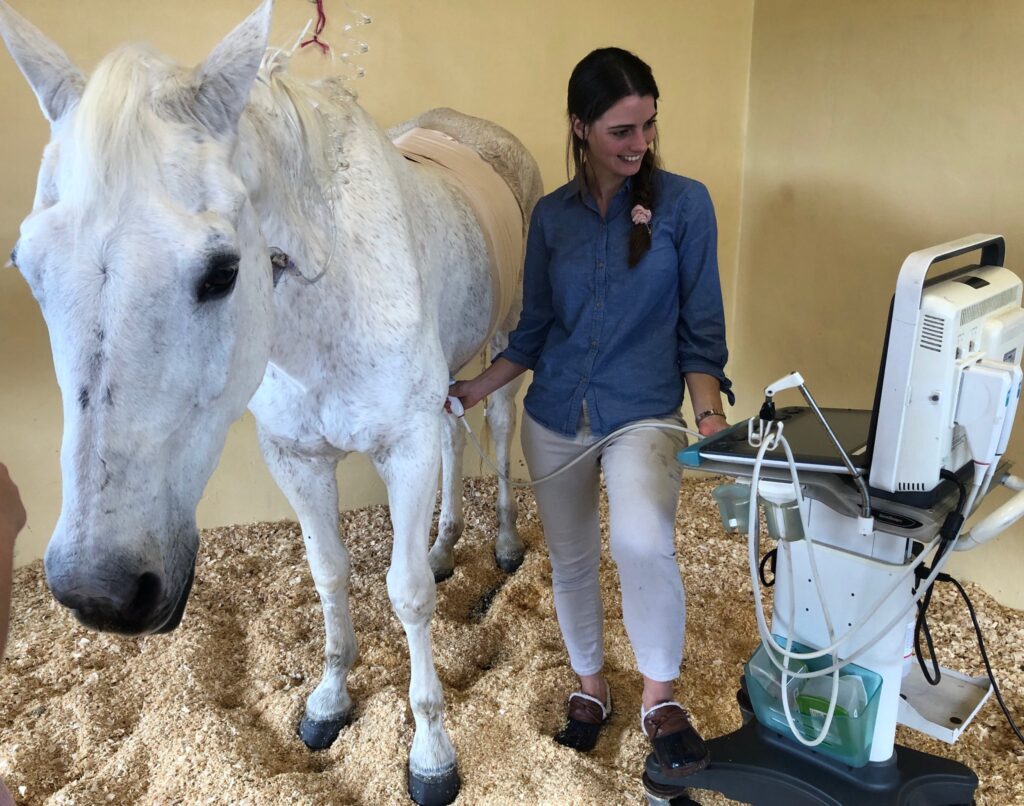
While not every geriatric colic case is well-suited for surgical intervention, Dr. Davis considers two factors before moving forward with any surgery. “The surgery has to make sense for the horse, meaning that they are a healthy candidate with the ability to recover, and they have the will to live,” said Dr. Davis, who noticed how resilient Belle was from the moment he saw her. “The other point is that the surgery needs to be financially reasonable for the client. In Belle’s case, there was a will to live, and a strong emotional connection with this horse.”
After a successful colic surgery, Belle was moved to recover in the Palm Beach Equine Clinic Hospital where she was cared for round-the-clock by Dr. Candelaria Chunco and hospital staff.
“Dr. Davis was great, and Candelaria was fantastic,” said Penn. “They were both so kind, and I received regular text updates. I knew that they were invested in her recovery. When she stood up after anesthesia, I remember Dr. Davis saying to me, ‘this horse is a badass’, and she really is!”
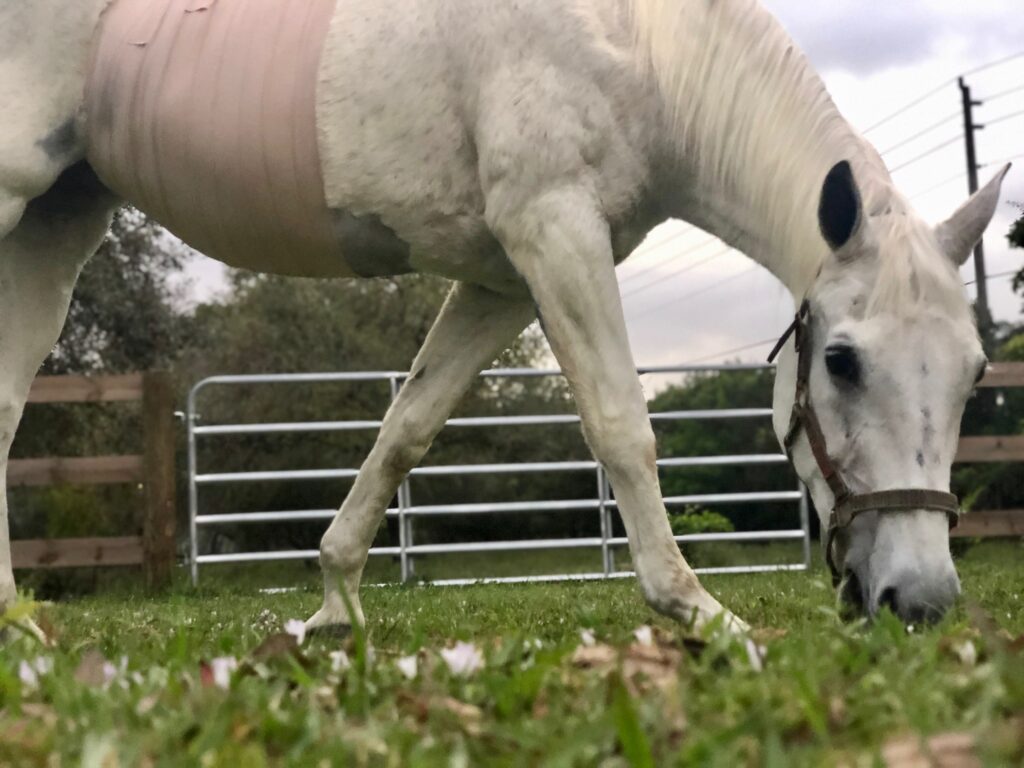
Belle returned home to Vero Beach, FL, on February 19, and celebrated her 34th birthday on March 27. “Her recovery was slow, but she is doing well, regaining an appetite, working her way back to regular turnout, and starting to act like her old self again,” said Penn. “She is an incredibly special horse to not only me and my mother, but to my husband, family, friends, and the horse community here. It’s so wonderful to have her back home.”
No matter what life may bring, our pets are here for us.
And Palm Beach Equine Clinic is here for them.
In our commitment to the health, safety and wellbeing of our patients, clients and community, Palm Beach Equine Clinic is expanding to treat all four-legged members of your family.
Whether you are concerned for the health of yourself, your loved ones, or simply doing your part to flatten the curve, our team of veterinarians is here to help by prioritizing the the health of your animals.
Save yourself from the stress and risks associated with taking your pet to the veterinarian. Please contact Palm Beach Equine Clinic for your small animal veterinary needs. A team of Palm Beach Equine Clinic veterinarians is able to care for your pets through select small animal veterinary services during this unsettling time.
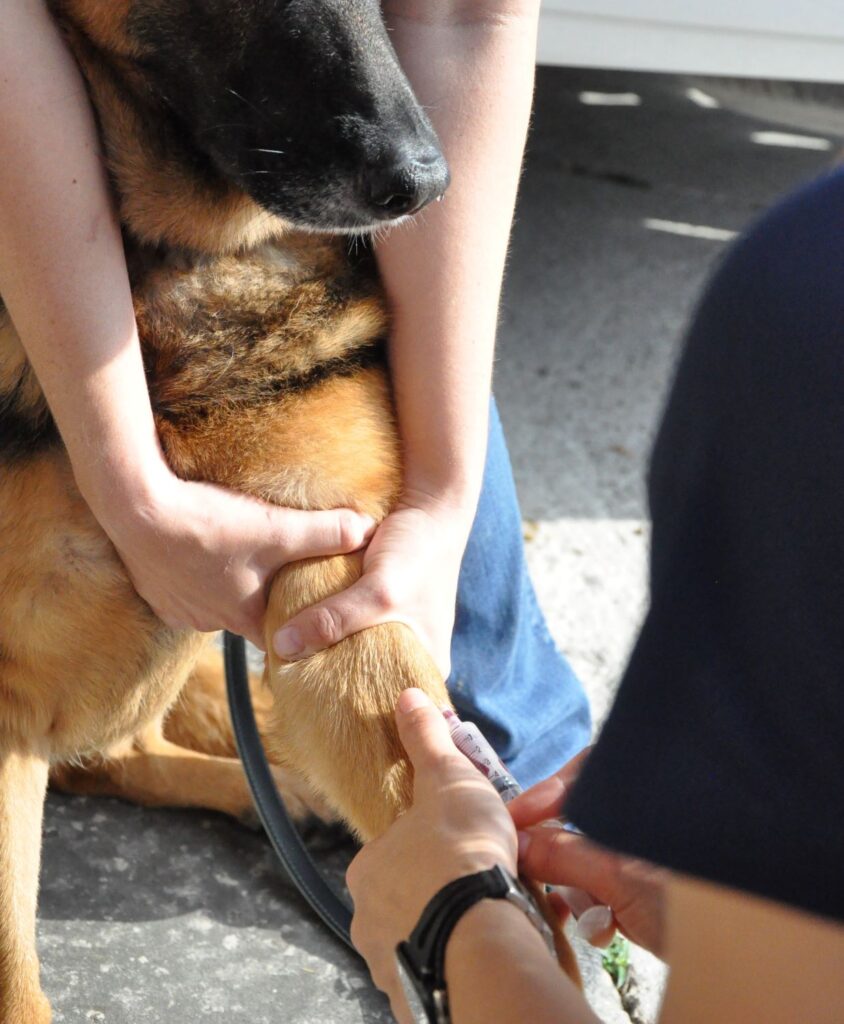
Here for the Health of All Barn Critters
Whether at Your Farm or at the Clinic
- Vaccinations
- Bloodwork & Fecal Testing
- Select Medications (such as heartworm or flea and tick treatments)
- Physical Exams
- Acupuncture

Don’t hesitate to ask your Palm Beach Equine Clinic veterinarian about the care of your pets. We are here to support you and your animals, and can provide accommodations to safely tend to your pets.
Call Palm Beach Equine Clinic for questions regarding your pets at 561-793-1599.
Updated April 24, 2020
In an executive order issued March 20, 2020, Florida Governor Ron DeSantis has directed all non-essential businesses in Palm Beach County to close. As a veterinary hospital, Palm Beach Equine Clinic is an essential business and will remain open.
Palm Beach Equine Clinic is committed to the care of equine patients and will continue providing care. Our equine hospital, laboratory, and diagnostic departments are fully functioning, expertly staffed, and equipped to treat any type of equine health condition. A Palm Beach Equine Clinic veterinarian is always available in the event of an emergency, 24 hours a day, seven days a week.
While our doors remain open to support clients through this distressing time, Palm Beach Equine Clinic is taking precautions to prevent the spread of COVID-19.
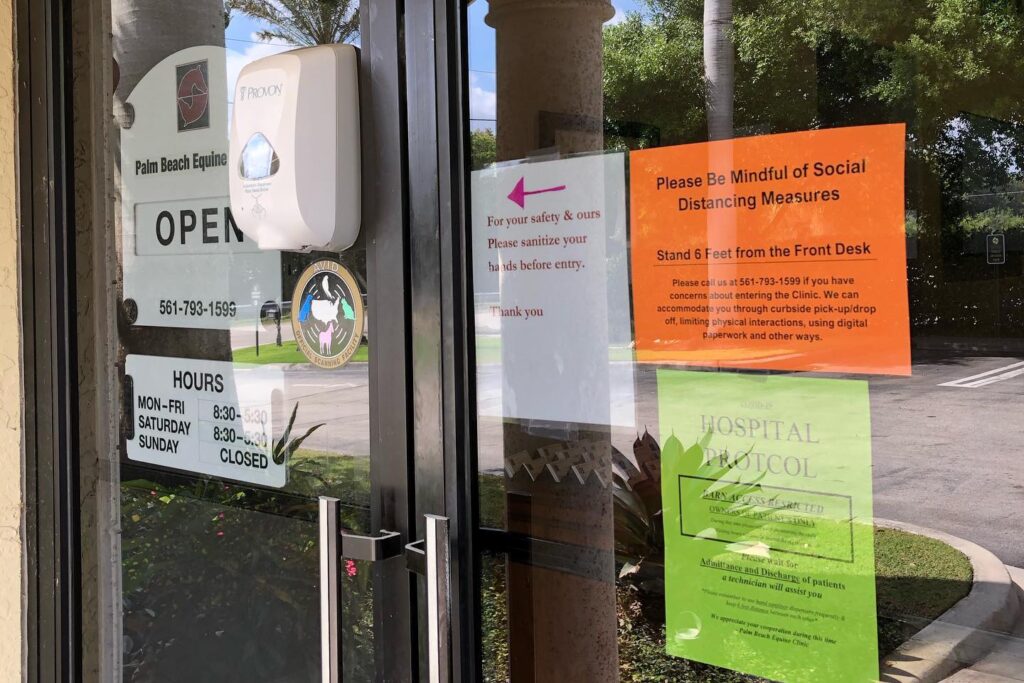
We greatly appreciate the cooperation and encourage those with concerns to call ahead so our team can safely accommodate you and your animals. Preventative measures such as curbside pickup/dropoff, digital paperwork, limited physical interactions, and other safety protocols are being implemented.
Palm Beach Equine Clinic Coronavirus Safety Protocols
- We ask that all visitors wear a protective mask/covering. Anyone on the property, whether in the lobby or hospital, must wear a mask to protect themselves and our staff.
- Hand sanitizers have been posted to our main doors and we encourage all clients to take a pump before entering the clinic.
- Hospital visiting hours have been limited to 8 a.m. to 5 p.m. Please speak with your PBEC veterinarian or call 561-793-1599 for any questions or clarification regarding visiting your horse at the hospital.
- Hospital access is restricted to owners of intensive care patients only.
- Owners are only permitted in the hospital for patient pick up and drop off. Please wait for patient admittance and discharge so a technician can safely assist you.
- As standard medical practice, Palm Beach Equine Clinic continues to implement high-level disinfection and sterilization of medical equipment and devices. To ensure our staff and clients are kept safe, stricter cleaning protocols have been implemented throughout the Clinic and will remain in place for the foreseeable future.
- Please limit the number of individuals present during your horse’s appointment. Our veterinarians are equipped with skilled technicians to handle your horse.
- Please be cognizant of social distancing measures even if you have no signs of illness. Please practice social distancing while at the clinic by keeping at least 6 feet apart from others. We have posted signs, laid down boundary lines from our front desk, and our staff is doing their part to physically separate from clients as best as possible.
- If you or a family member are not feeling well, suspect you have been exposed to COVID-19, or have recently traveled to areas with active COVID-19 transmission, please call the front desk at 561-793-1599 to reschedule your horse’s appointment or arrange for another person to be present at the appointment.
- We encourage horse owners and barn managers to be prepared in the event that they or their staff becomes ill and cannot care for their horse. Having a dependable backup caretaker for your horse and organizing clear instructions on feed, medications, exercise and general care is crucial to preparedness planning.
Palm Beach Equine Clinic continues to stay up to date on COVID-19 developments and will update our clients, partners and fellow equestrians as the situation progresses. Contact Palm Beach Equine Clinic at 561-793-1599 for questions or to speak with a veterinarian.
Additional Coronavirus Resources & News for Veterinary Clients
A View 6-Feet from the Track
Dr. David Priest comments on veterinary life amid COVID-19 and specifically on its impacts in…
Care for Our Horses and Equestrians Amid COVID-19
The following information was requested by the Village of Wellington and posted at https://www.wellingtonfl.gov/767/Equestrian-Information By…
Coronavirus & Veterinary Medicine on Horse Radio Network
Dr. Scott Swerdlin talks COVID-19, equine veterinary medicine, and horse industry impacts with The Horse…
Hunkering Down? We’re Here for You & Your Pets
No matter what life may bring, our pets are here for us. And Palm Beach…
Dr. Scott Swerdlin Discusses His Thoughts on Being Strategic About Your Horse’s Health During the COVID-19 Pandemic
As we all know, the United States Equestrian Federation has suspended all points and ratings for the immediate future as a result of the coronavirus (COVID-19) pandemic. This unfortunately resulted in the cancellation of the Winter Equestrian Festival, Adequan Global Dressage Festival, and major equestrian competitions around the world. However, this does not mean that all riding and training must come to a halt.
For the health and safety of ourselves and our loved ones, we must follow recommendations from the Center for Disease Control and Prevention to help reduce the spread of COVID-19. We are fortunate that Wellington, specifically the Equestrian Overlay Zoning District, is not a high-density area. Wellington offers picturesque bridle paths, idyllic weather and an abundance of expertise in all facets of the equine industry. Now is a unique opportunity for those who have been occupied by hectic schedules to take a step back, de-stress and even enjoy social distancing by saddling up and exploring the endless miles of excellent bridle paths.
Let’s make the most of our time in Wellington while awaiting the unclear future of the COVID-19 pandemic by continuing to ride and train our horses. Let’s try to keep a degree of normalcy in our daily routines and use this time wisely by improving both horse and rider health and well-being. Let’s use this time to ensure our horses remain in peak performance and ready to resume competition schedules when that time arrives.
Avenues for Enhancing and Maintaining Optimal Equine Health
It is vital for teams to have a veterinarian by their side keeping a close eye on the equine athlete’s health, performance and well-being. Closely monitoring a horse’s condition is key to catching potential injuries before they progress into issues that require more serious treatments. Here are some recommendations to consider incorporating during this break in competition that may benefit your horse when its time to step back into the show ring.
Preventive Medicine
Now is a perfect time to update your horse’s vaccinations and make sure your horse is ready to step back onto the showgrounds when competition resumes. Spring equine vaccinations to consider include:
- Encephalomyelitis, Eastern (EEE) and Western (WEE)
- Influenza
- Rhinopneumonitis (Herpesvirus)
- West Nile Virus
- Rabies
- Tetanus
- Strangles
For horses returning to areas where Potomac Horse Fever exists, a booster for that disease is highly recommended. Ensuring your Coggins test and records are up to date is always beneficial. For questions regarding equine vaccinations, please call Palm Beach Equine Clinic at 561-793-1599 to speak with a veterinarian.
Maintenance & Regenerative Medicine
Allowing our equine athletes to thrive while extending their performance careers may require Sport Horse Medicine to improve their comfort, well-being and performance. Many horses benefit from having their hocks, stifles, and/or coffin joints injected. Horses must be thoroughly evaluated by a sport horse veterinarian to determine the necessity and potential benefit of maintenance medicine before any corticosteroid injection is administered.
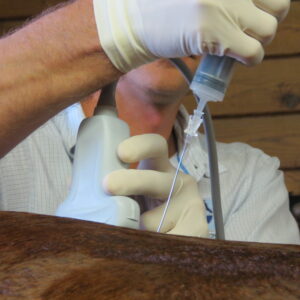
To further address the wear and tear incurred from intense training and competition, Regenerative Medicine is a non-steroidal option for activating and enhancing the horse’s innate bodily healing process. Palm Beach Equine Clinic offers advanced regenerative therapies for treating musculoskeletal injuries, osteoarthritis or degenerative joint disease.
- Platelet Rich Plasma (PRP)
- Interleukin-1 Receptor Antagonist Protein (IRAP)
- Autologous Conditioned Serum
- Pro-Stride Autologous Protein Solution
Alternative Therapies
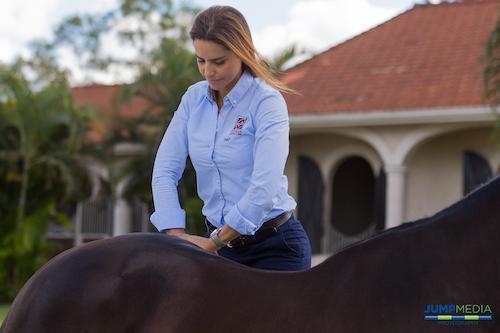
Employing a holistic approach to treating patients, Palm Beach Equine Clinic offers veterinarians with a wealth of expertise in Alternative Medicine. Alternative therapies are often used in conjunction with traditional medicine and can be uniquely tailored to enhance a horse’s performance and overall health.
- Equine acupuncture and electroacupuncture
- Veterinary chiropractic manipulations
- Laser therapy (from low-level to regenerative laser options)
- Shockwave therapy
- Chinese Herbal Medicine
Reproduction & Fertility
Now may be the perfect time to plan for a future competition partner by breeding your horse. Palm Beach Equine Clinic is proud to offer highly successful Embryo Transfer program. Utilize this time to begin the breeding process by having your mare safely bred through artificial insemination, with the embryo collected 7-8 days after pregnancy. A detailed Breeding Soundness and Fertility Evaluation can jumpstart your future show ring champion. Palm Beach Equine Clinic provides veterinarians with expertise in Advanced Reproductive Services and Fertility Solutions, including:
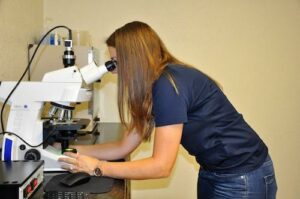
- Stallion or Mare Breeding Soundness and Fertility
- Embryo transfer: an ideal option for mares with busy competition schedules
- Genetic cloning (geldings, mares or stallions)
- Artificial insemination and semen collection, freezing, storage and shipping
Palm Beach Equine Clinic remains open and fully equipped with a team of 40 veterinarians, 60 technicians, fully stocked pharmacy, all-inclusive equine hospital and surgical suites. Speak with a PBEC veterinarian about your horse’s health and performance by calling 561-793-1599.
To Address Raised Concerns
The spread of the novel coronavirus has raised serious concerns as the status of the virus continues to evolve. As equine veterinarians, Palm Beach Equine Clinic is here to clarify questions raised regarding the potential impact of this disease in the equine industry.
Coronaviruses include a large group of RNA viruses that cause respiratory and enteric symptoms and have been reported in domestic and wild animals. Equine Enteric Coronavirus and COVID-19 are both coronaviruses, however, they are distinctly different viruses.
The Center for Disease Control and Prevention (CDC), infectious disease experts, and multiple international and national human and animal health organizations have stated that at this time there is NO EVIDENCE to indicate that horses could contract COVID-19 or that horses would be able to spread the disease to other animals or humans. Equine enteric coronavirus and COVID-19 are NOT the same strains and there is no indication that either are transmissible between species.
Therefore, it is important to concentrate on the health of our equestrians by being precautious and following recommendations from public health officials. Palm Beach Equine Clinic will continue to make every effort to stay informed of developments with COVID-19, and will continue to provide veterinary care to all horses regardless of the status of this disease.
A Profile of Equine Enteric Coronavirus
Equine coronavirus is an enteric, or gastrointestinal, disease in the horse. There is NO EVIDENCE that equine enteric coronavirus poses a threat to humans or other species of animals.
- Transmission: Equine coronavirus is transmitted between horses when manure from an infected horse is ingested by another horse (fecal-oral transmission), or if a horse makes oral contact with items or surfaces that have been contaminated with infected manure.
- Common Clinical Signs: Typically mild signs that may include anorexia, lethargy, fever, colic or diarrhea.
- Diagnosis: Veterinarians diagnose equine enteric coronavirus by testing fecal samples, and the frequency of this disease is low.
- Treatment and Prevention: If diagnosed, treatment is supportive care, such as fluid therapy and anti-inflammatories, and establishing good biosecurity precautions of quarantining the infected horse. Keeping facilities as clean as possible by properly disposing of manure will help decrease the chances of horses contracting the virus.
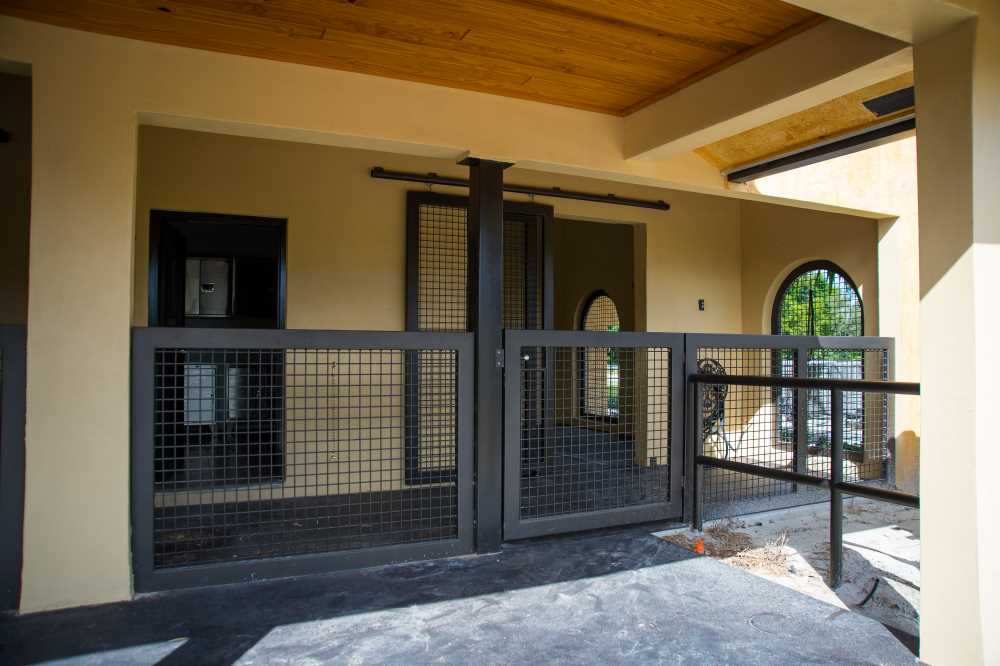
Information for this notice was compiled using the following sources:
Cornell Animal Health Diagnostic Center: https://www.vet.cornell.edu/animal-health-diagnostic-center/veterinary-support/disease-information/equine-enteric-coronavirus
American Association of Equine Practitioners, Equine Disease Communication Center: https://aaep.org/sites/default/files/Documents/Outside%20Linked%20Documents/DiseaseFactsheet_Coronavirus.pdf
Dr. David Priest Utilizes Dynamic Endoscope and Performs Surgery to Help Four-Year-Old Harness Racer Get Back in Action
For equine athletes to perform their best, optimal respiratory health is crucial, and particularly paramount for harness racehorses. According to Dr. David Priest, Palm Beach Equine Clinic veterinarian with a keen interest in respiratory health, a racehorse moves roughly 70 liters of air through its lungs over the duration of one second while exercising. To simulate the movement of that amount of air outside the anatomy of a horse’s body, it would require two industrial ShopVacs on full power.
A colloquial condition known as “roaring”, or recurrent laryngeal neuropathy, is a fairly common issue among horses, and it restricts the amount of air able to reach the lungs through the horse’s upper respiratory system. The condition usually affects the left side of the larynx – the equine left recurrent laryngeal nerve is longer than the right – with paralysis that does not allow for an adequate amount of air to travel to the lungs.
According to Dr. Priest, equine anatomy plays a factor in the prevalence of this condition. There is a correlation with the length and size of the neck to the nerve pathways that travel from the brain to the chest, around the heart, and back up to the throat. Although mild cases of recurrent laryngeal neuropathy can be tolerated, the condition becomes particularly serious when a horse’s work involves high-intensity aerobic exercise.
“We often see recurrent laryngeal neuropathy described as a paralyzed flapper,” said Dr. Priest. “If you imagine the flaps of the larynx as cabinet doors, then the horse should be able to hold the doors open without problem while at rest. Yet, when the airflow picks up during exercise, that muscle is sometimes not strong enough to hold the doors open, and it collapses into the airway.”
Just before the start of 2019, Dr. Priest received a call from Stephanie Reames, the trainer of a four-year-old harness racehorse with symptoms pointing to recurrent laryngeal neuropathy. During his diagnostic process, Dr. Priest performed an endoscopy while the horse was resting to provide a baseline observation.
“I saw what I thought was a minor abnormality, but I did not know what amount of laryngeal strength this horse had,” said Dr. Priest. “The roaring noise usually occurs when the disease is progressive, and this horse was making a little bit of noise.
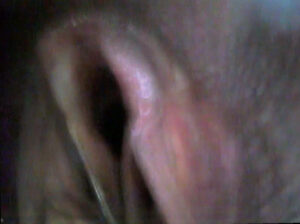
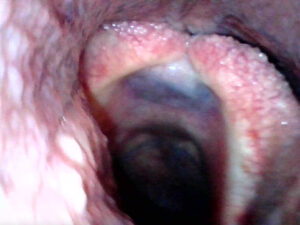
“This particular horse was in training for the harness racing season, so the owners and trainer wanted to figure out the root of the issue as swiftly as possible,” continued Dr. Priest. “The most effective way to accomplish that is to utilize a dynamic endoscope.”
A dynamic endoscope is a video recording device worn by the horse during exercise. It allows veterinarians to see the larynx, and therefore view signs of recurrent laryngeal neuropathy in real-time. Dr. Priest observed the disease as a grade C on the universal grading system for rating the disease, which translates to a full collapse of the left larynx flap.
Once diagnosed, Dr. Priest recommended an aptly-named laryngeal tie-back surgery, which involves stitching the larynx flap to surrounding cartilage in order to hold it open for optimal airflow. He performed the surgery at Palm Beach Equine Clinic a couple of days after making the diagnosis, and the horse returned home to its training base at South Florida Training Center in Lake Worth, FL, the same day.
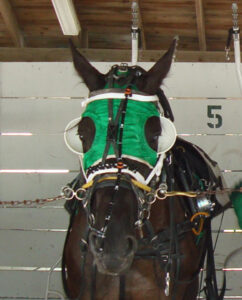
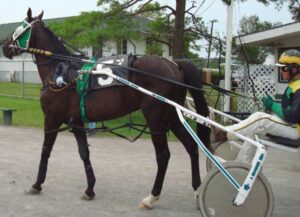
The suggested recovery time is 30 days to allow for the surgical incisions to heal. Once healed, this horse immediately returned to full harness racing training.
“The horse is doing fantastic and we are hoping to qualify for racing in the next three weeks, and we will most likely head north to Pennsylvania to race,” said Reames. “Dr. Priest is absolutely amazing and was extremely professional from start to finish. There is always a hesitation when you learn that a horse needs surgery, but Dr. Priest was so prompt with the diagnosis and procedure, and the horse healed so quickly. We have high hopes for another successful racing season!”
In February of 2020, Dr. Priest performed a second dynamic endoscopy to observe the condition and effectiveness of the tie-back surgery. “The disease usually results in a 20-30% reduction in airflow, which causes a small performance decline resulting in a speed reduction of maybe one second. This horse’s particular case was perfect at the one-year check, which is key because that one second can be the difference between winning and losing!”
Evaluate your Horse’s Respiratory Health by Contacting PBEC
Palm Beach Equine Clinic board-certified radiologist Dr. Sarah Puchalski was featured in A Guide to Equine Diagnostic Imaging in the February 2020 issue of The Horse.
Learn more about equine diagnostic imaging by visiting our advanced diagnostic imaging page.
Back From The Brink
Dr. Santiago Demierre Gives Peachy a Second Chance
When two-year-old Quarter Horse filly Peachy decided to jump out of her paddock for a night-time stroll this past November, she got herself into some creative “young horse” trouble. After tipping over a garbage can containing bailing wire, she became entangled in the wire and her attempts to kick free resulted in the wire penetrating the wall of her right hind hoof and looped through the sole. The more the filly kicked, the deeper the wire went until it pierced the opposite side of the hoof wall and protruded out the other side.
The first call owner Corey Chilcutt made was to the clinic, and on-call veterinarian Dr. Santiago Demierre responded immediately.
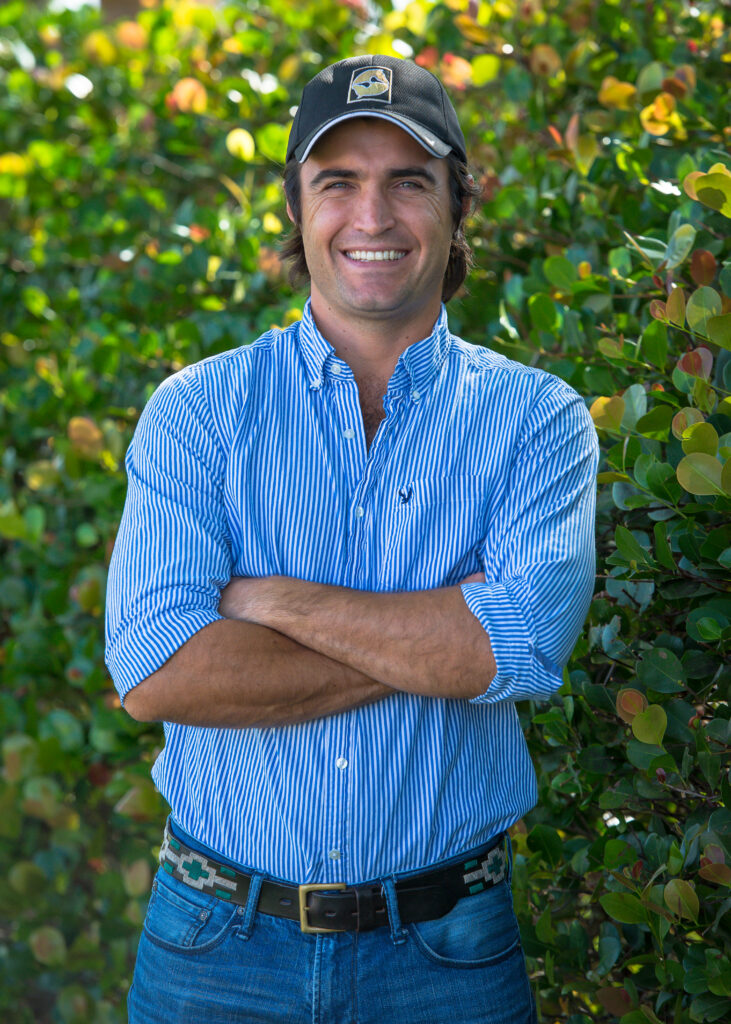
Not So Peachy Anymore
“When I arrived, the two ends of wire that looped over the horse’s back had been cut down so it was only the wire penetrating the hoof,” said Dr. Demierre. “She was stressed and in a great deal of pain. I sedated the horse and blocked the foot so she would not feel any more pain.”
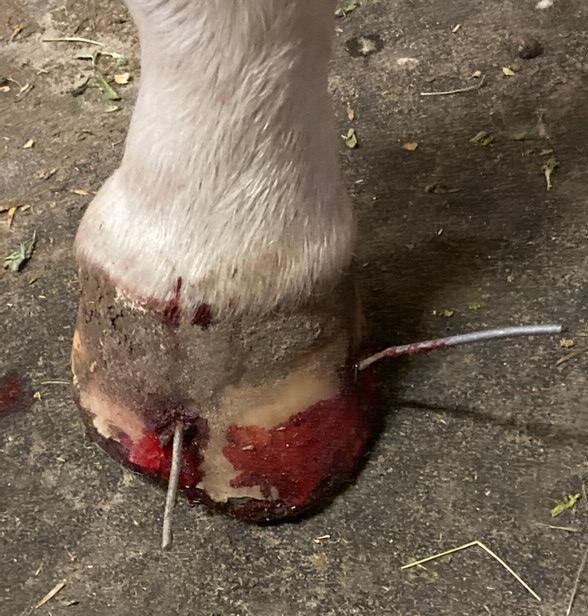
Once Peachy, who is in training to run barrels in Loxahatchee, FL, was comfortable, Dr. Demierre utilized portable radiograph technology to obtain x-ray images of the right hind foot and evaluate the injury. The images revealed that it was safe to remove the wire, and after disinfecting the area, Dr. Demierre removed the wire through the injury site.
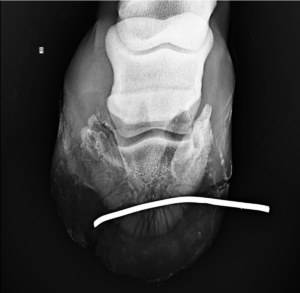
“There were no fractures or synovial structures involved, but I did see on the radiograph that the coffin bone was compromised,” said Dr. Demierre. “There was a suspicious line through the coffin bone that could have led to chronic lameness, so the prognosis for performance was reserved. The prognosis for survival was very positive, and I told the owner there was a 50/50 chance she would return to training.”
Once Peachy’s hoof was free from the wire, Dr. Demierre soaked the foot in disinfectant, and began an aggressive course of antibiotic treatments, including regional distal limb perfusion and systemic antibiotics. Finally, the foot was wrapped while the treatments did their work.
Dr. Demierre returned to check on Peachy and continue the antibiotic treatments six times over the past two months. “I performed recheck radiographs of the hoof a month after the injury and there was no fracture where we saw the initial line that caused concern,” said Dr. Demierre. “The margins of the coffin bone had reabsorbed slightly, but overall the injury was healing well.”
Once the bandages were removed, Dr. Demierre worked with Chillcutt’s farrier, Juan Rivera, on a therapeutic shoeing plan. Rivera used a hospital plate with disinfectant on the injured hoof, and a bar shoe with a pour-in pad on the opposite hind hoof. At the first shoeing reset a month later, he transitioned the right hoof to a bar shoe with a pour-in pad.
Peachy’s recovery plan included stall rest until Dr. Demierre gave the green light for hand walking six weeks after the injury. At eight weeks, she was trotting on a lunge line, and earlier this month Peachy’s rider Kloey sat on her for the first time.
“The outcome was excellent,” said Dr. Demierre. “She is perfectly sound with no medication and will be back in normal shoes by the end of this month.”
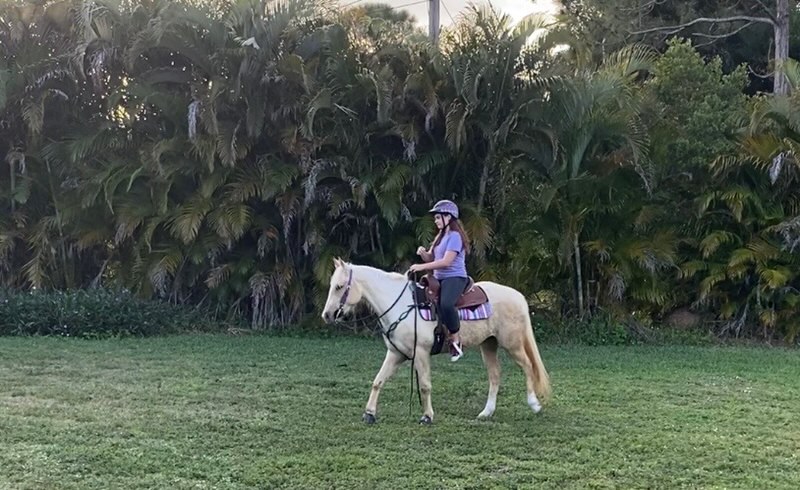
Photo courtesy of Corey Chillcutt
Chillcutt is hopeful that Peachy and Kloey will return to their training and will be running barrels in the future. “Dr. Demierre was amazing; his treatment plan was successful and Peachy was back to work much quicker than we ever thought. Words can’t describe the gratitude we have for Dr. Demierre, his technician Emma Sexton, and everyone at the clinic. Their dedication has been phenomenal.”
As of February 14, Peachy is back to her old self, according to Chillcutt, who noted, “She is happy to be back to work and she loves her job!”
Palm Beach Equine Clinic is the only equine veterinarian based in Wellington, FL, with the powerful SmartRLT Laser.
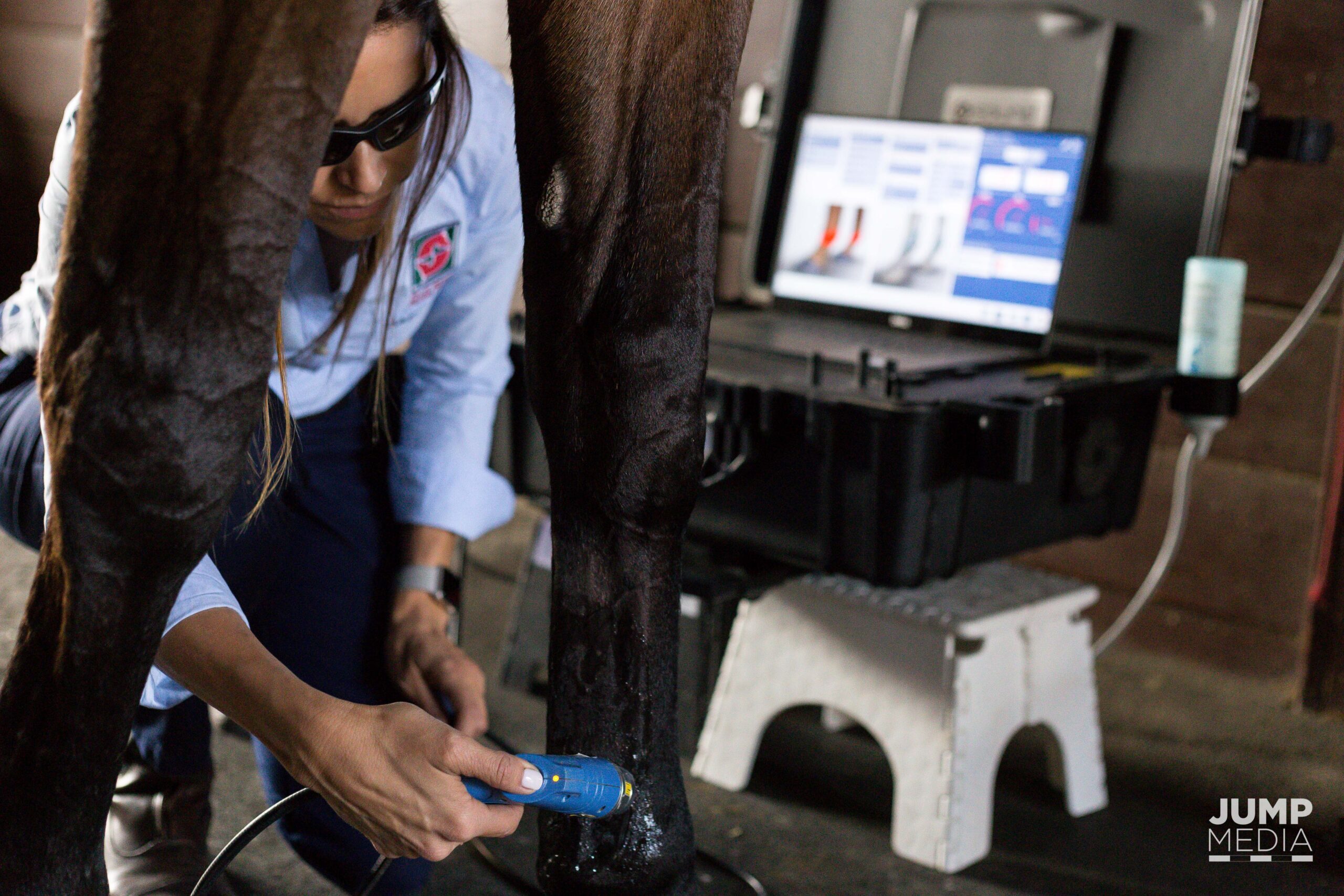
Dr. Natalia Novoa utilizes this revolutionary sport horse medicine tool to treat a variety of injuries and wounds with clinically documented success. The SmartRLT laser is a portable Class IV laser, the most potent and dynamic on the market, as an essential non-invasive therapy for use in the barn and at horseshows. Not only is Dr. Novoa’s regenerative laser extremely effective in treating injuries that were previously considered career-ending, but it is also especially beneficial for enhancing body condition and performance of the equine athlete.
Clinical and scientific results of the SmartRLT include:
- Repair of ligament and tendon lesions
- Reduces scar tissue within and around injuries
- Reduces inflammation
- Increases collagen production
- Increases blood circulation to bring nutrients to the site
- Realigns muscle fibers for stronger healing
- Provides analgesia (reduces pain)
- Enhances tissue oxygenation
- Increases cell proliferation (generates more cellular energy)
Regenerative Laser Therapy has successfully treated injuries to structures such as:
- Cartilage/bone/joints
- Neck and poll, stifles, temporo mandibular joint (TMJ), hocks, fetlocks, and coffin joint
- Sore feet and laminitis
- Sore muscles (especially back and gluteal)
- Suspensory ligaments and branches
- Superficial flexor tendons
- Deep digital flexor tendon and its insertion inside the hoof
- Inferior and superior check ligaments
- Collateral ligaments
- Summer sores and scratches
- Scar tissue
- Open wounds and punctures
- Sub-dermal infections
- Post-operative incisions
- Sacroiliac joint and kissing spine
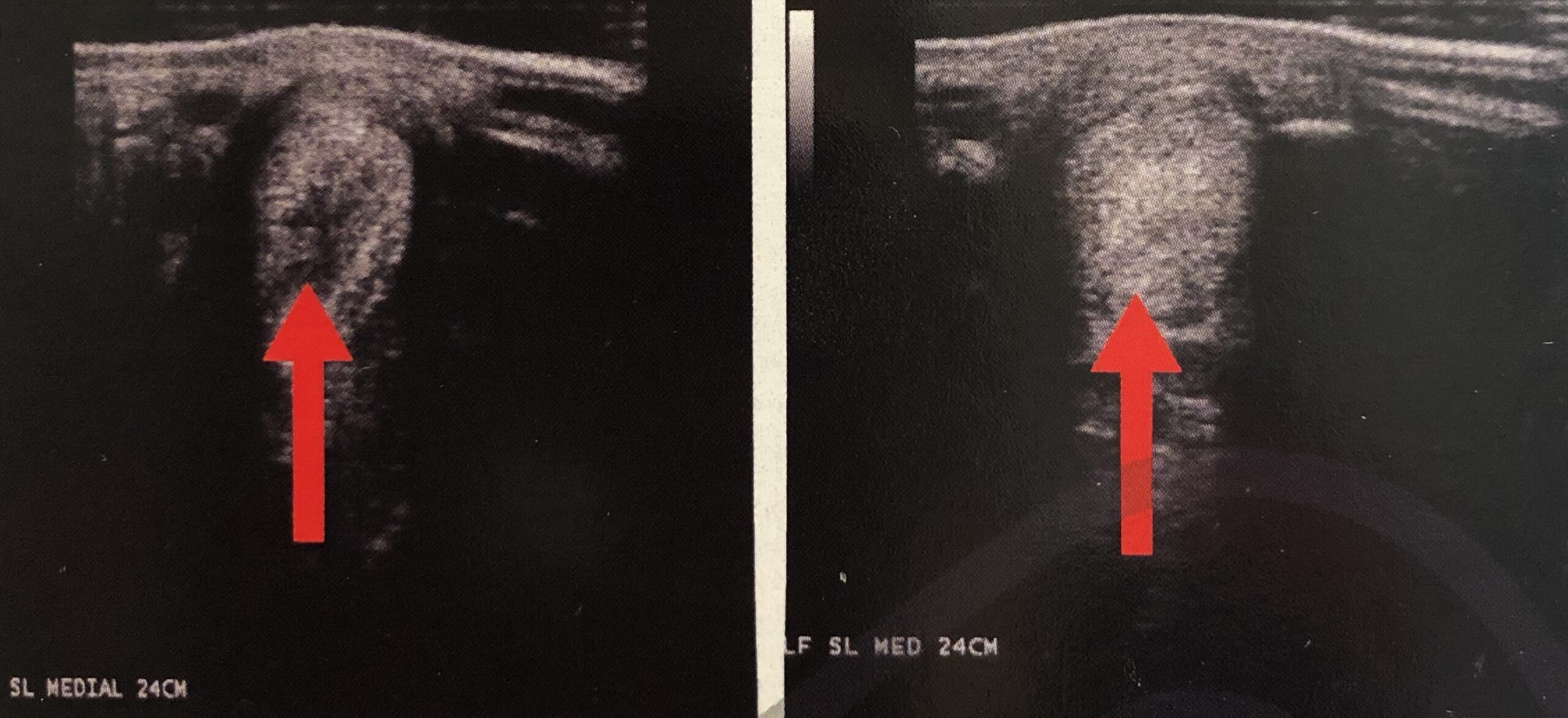

Regenerative Laser Therapy Case Study: Lameness
| Patient Condition | Grand Prix level show jumper with left front lameness. |
| Evaluation | Magnetic Resonance Imaging (MRI) showed intra-osseous fluid accumulation in the left front third metacarpal condyle. |
| Treatment | 20 sessions of Dr. Novoa’s SmartRLT. |
| Result | Fluid in the third metacarpal condyle was resolved. |

Custom Treatment for Your Unique Horse

Dr. Novoa’s SmartRLT is a pioneering technology that has evidence-based settings and treatment protocols to optimize the effectiveness for each unique patient. Treatments are customized for the specific structure, acute or chronic conditions, deep to superficial and skin pigmentation to reach the best outcomes.
Regenerative Laser Therapy provides a warm, soothing sensation and does not require sedation. Treatments can be performed at the barn or horseshow. Be sure to share your competition schedule with your veterinarian so treatments can be done within a safe and legal timeframe.
General Protocols for Regenerative Laser Treatments
Pre and Post Performance: 1-3 sessions
Acute Conditions: 6-10 sessions for the first two weeks
Chronic Conditions: 2-3 sessions per week for approximately 10 weeks
Laser Therapy 101
Laser therapy is beams of electromagnetic energy that interact chemically and biologically with the targeted tissue or injury. This creates photobiomodulation, allowing maximum penetration of tissue structures. Laser therapy releases endorphins while increasing cellular activity, blood flow and enhancing tissue oxygenation. Essentially, it enhances the body’s natural healing mechanisms and expedites the restorative process.

Regenerative Laser Therapy goes far beyond standard lasers.
Regenerative Laser Therapy releases greater energy per pulse to create a photomechanical effect at the cellular level. It can be directed to the target injury or lesion to regenerate, revitalize, remodel, repair and realign tissue. Therefore, it is essential for equine sports medicine, lameness, rehabilitation and optimizing performance.
Regenerative Laser Therapy may only be administered by a veterinarian. Dr. Novoa is the only veterinarian based full-time in South Florida offering the SmartRLT treatments.
